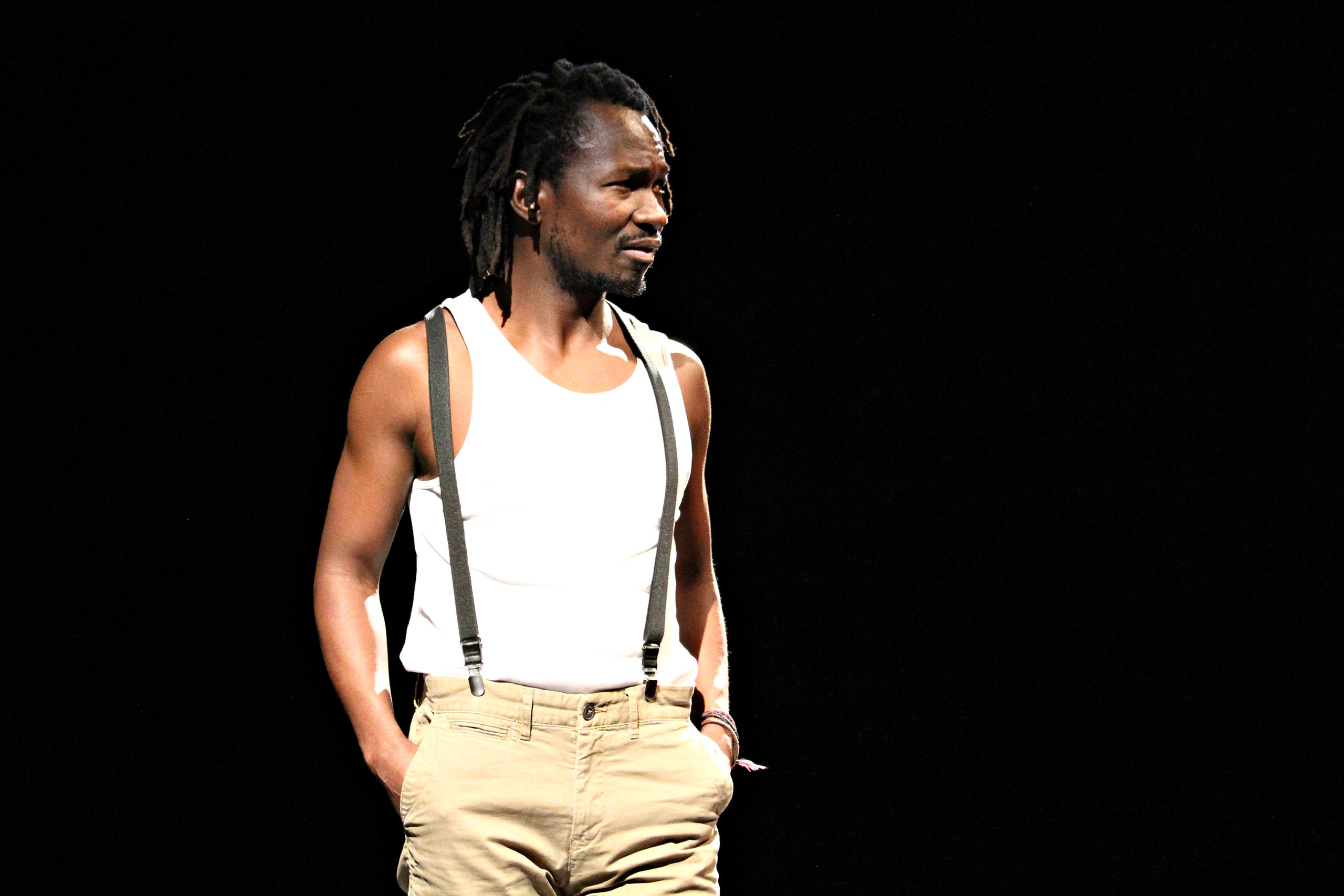How a Malawian actor found his voice in Switzerland

Mbene Mwambene is the first African to have graduated from a unique theatre programme in the Swiss capital. His work confronts audiences with the realities of his daily life in Europe.
In a recent solo piece called “The Whispers”, MwambeneExternal link, who is from Malawi, moves backwards in the beam of a spotlight, reciting the lines in a forceful staccato: “I am visible. I am the black man. I am the stranger.” He softens his voice, fixes his gaze on the audience. “I am the danger. I am the fear. I am the dark. I am the others.” By the time he speaks the last lines, he is standing still, in the semi-darkness of the bare stage: “I am just a person. I am the reality.”
Theatre provides a safe space that allows the theatre director, performer and playwright “to tell my own stories”, as he says, sitting in a café near Bern’s railway station.
“I don’t want to ignore who I am: I am a black man living in Europe.”
From Blantyre to Bern
Mwambene’s journey to Bern was circuitous, littered with obstacles and a few fortunate encounters.
After working as a journalist in Malawi, an audition launched his acting career and led to a contract with the Nazikamba Arts theatre in Blantyre, the country’s second-largest city. After seeing him perform, the director of the Theater Konstanz in Germany, Christoph Nix, cast him in his one-man play “The Story of the Tiger”, a political piece adapted from the work of Italian playwright Dario Fo.
For several years, Mwambene toured in Germany with “The Story of the Tiger”. He also tried for years to find a way to study there. “I got only ‘Nos’, weil mein Deutsch ist sehr schlecht,” he says, laughing. Fulfilling the German-language requirement while living in Malawi was an insurmountable obstacle.
PLACEHOLDER
Then he heard about HKB’s Master’s programme in Expanded TheatreExternal link through a friend. The university had taken the unusual step of opening the programme to international students, becoming the first performing arts Master’s programme in German-speaking Europe to offer instruction in English. To date, more than a dozen non-German-speaking students have completed the programme, including students from Asia, Africa and South America.
“Students from outside Europe bring the theatre culture from their countries of origin with them. That’s what we want,” says Wolfram Haberle, deputy head of the HKB theatre department, stressing that different experiences and perspectives enrich the programme. “The students contribute as much to the programme as they gain from it.”
Crowdfunding tuition
Although he was accepted based on his talent and theatre experience, Mwambene still had to produce the required financial guarantees before being allowed study in Switzerland. A German friend suggested crowdfunding. He raised enough to cover most of the costs, supplementing the rest with his performance fees and a scholarship he received after beginning his studies. Mwambene completed the Expanded Theatre Master’s degree in 2015, becoming the first African to do so.
The hurdles for African students are often higher because of the difficulties they face getting residency permits, meeting the financial guarantees or not being able to earn a BA in theatre in their home countries, explains Haberle. These students are highly motivated, he says.
“All the students who come from great distances want to do this programme, otherwise they wouldn’t go through all the hardships.”
Being black in Europe
Mwambene’s performances absorb and reflect his encounters with xenophobia, stereotyping and outright racism in Switzerland and Europe.
“In Malawi racism wasn’t an issue for me, but here in Switzerland I am constantly confronted with the image people have of ‘the black man’,” he says. He gives examples of well-meaning strangers asking him to teach them how to dance when they hear he is from Africa, being asked which refugee camp he passed through or being stopped by the police and searched for drugs.
All of these experiences leave a mark. “Here, I’m not just African. I’m a label,” says Mwambene.
The “I am” monologue in “The Whispers” grew out of that. The play was produced at the Schlachthaus theatre in Bern by Ntando CeleExternal link, a South African performer and director, who came to Switzerland on a residency sponsored by the Pro Helvetia foundationExternal link. Together with musician Simon Ho and her husband, the writer and theatre director Raphael Urweider, she also founded Manaka Empowerment Prod.External link to help performers like Mwambene find a platform and funding for their productions.
Like Mwambene, Cele’s multiple experiences with racism and stereotyping form the basis of her work.
“In Europe it’s the thing I have to talk about. I ran away from that discussion in South Africa, where racism is intertwined with everything. Here, I’m trying to humanise black people.”
Confronting the audience
Cele feels “compelled by a series of incidents” to confront her audiences with the realities black people face in Europe. For example, she asked one theatre in Germany why they chose blackfacing – painting the faces of white actors black – over hiring an African and was told “we couldn’t find a black performer”. When she walks home from a theatre performance at night, she says she is often taken for a prostitute, a prejudice experienced by most of the black women she knows who live in Switzerland. People avoid sitting next to her on the bus or check their bags when she sits down.
“When I experience racism or hear racist comments, I feel a jolt. It’s difficult to translate this experience for people who don’t know this jolt,” she says.
Mwambene’s and Cele’s work is rooted in the racism of today and of the past. Cele notes that people in Switzerland are quick to point out that their country didn’t colonise. But she says the country’s discussion about racism has barely begun, largely because it focuses on the migrant issue rather than on the larger question of judging based on skin colour.
Building understanding
For her solo piece BLACK OFFExternal link, Cele created the “white alter ego” Bianca White. Wearing a blonde wig and painting her face white she channels the stereotypical white “Madam”, the misguided do-gooder seemingly oblivious to her racist attitudes. Lines like “You know, I like blacks. I used to have some of them – as friends”, or “I like being here with you white people that like complicated art” make audiences in Europe cringe or laugh even when a line is not intended to be humorous, says the artist, recounting particularly unamused, “stony-faced” audiences in Brussels and Basel.
Cele and Mwambene are aware that audiences in Switzerland don’t always understand the references in their performances. In “Black.Space.Race”, a play produced by the Manaka Empowerment Production at the Schlachthaus last year, Cele and another black actor do a fast-talking segment with various allusions ranging from “Uncle Tom’s Cabin” to the #BlackLivesMatter movement. Did the audiences get it? Cele shakes her head. “They took it very lightly.”
But Mwambene is hopeful about the lack of understanding. “If someone doesn’t understand, it’s a beginning, because they’ll ask questions. They are interested enough to be there to see the plays.”
Upcoming performances
Mbene Mwambene in “ZufluchtExternal link“, an experimental theatre performance about migrants and refugees:
16-18 April, Kulturmarkt, Zurich
20 April and 3 May, St. Gallen
17-18 May, Autonome Schule, Zurich
24-25 May, Kulturfabrik, Wetzikon
He also performs in FOOTTIT UND CHOCOLAT at Theater Konstanz, Germany: 22/30 June and 3/5 July
Ntando Cele in BLACK OFF:
13-14 April, TWEETAKT Festival, Utrecht, Netherlands
12 June, Dramatikerinnenfestival, Graz, Austria
31 August-15 September, Festival de la Bâtie, Geneva
11-15 September, Festival Porto Alegre em Cena, Porto Alegre, Brazil

In compliance with the JTI standards
More: SWI swissinfo.ch certified by the Journalism Trust Initiative


You can find an overview of ongoing debates with our journalists here. Please join us!
If you want to start a conversation about a topic raised in this article or want to report factual errors, email us at english@swissinfo.ch.